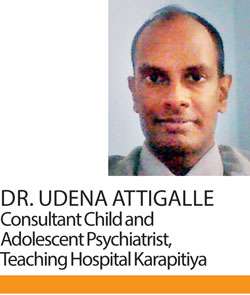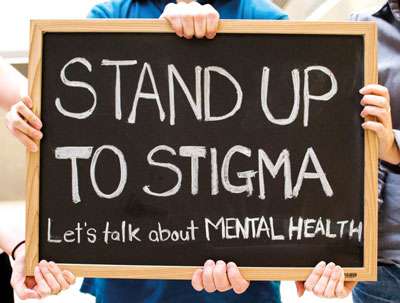27 Jul 2018 - {{hitsCtrl.values.hits}}

 A mental health issue is like any other medical issue, or is it? What would you do if you have fever, or severe abdominal pain? The majority of us would not hesitate to seek medical help, if we think that it may be something serious. But are we honestly giving mental disorders the same attention that we give physical illnesses? Even though 1 in every 4 people worldwide is likely to suffer from a mental disorder, according to the WHO, many people are reluctant to seek help, due to the stigma associated with mental illnesses.
A mental health issue is like any other medical issue, or is it? What would you do if you have fever, or severe abdominal pain? The majority of us would not hesitate to seek medical help, if we think that it may be something serious. But are we honestly giving mental disorders the same attention that we give physical illnesses? Even though 1 in every 4 people worldwide is likely to suffer from a mental disorder, according to the WHO, many people are reluctant to seek help, due to the stigma associated with mental illnesses.
Today, on Health Capsule, we have consulted Dr. Udena Attigalle, Consultant Child and Adolescent Psychiatrist, Teaching Hospital Karapitiya, in the hope of obtaining more information on mental health disorders, as education is an important component of removing the stigma associated with mental health issues.
It’s not all black and white
Mental health issues are a spectrum, varying from mild to severe, explains Dr. Attygalle. The spectrum for each category of mental health issue consists of various signs. Milder symptoms are named as ‘problems’, while moderate to severe symptoms are likely to be diagnosed as a ‘disorder’. For it to be diagnosed as a disorder it has to affect one’s life significantly, the doctor clarifies. Have you ever felt down, hopeless, losing interest in the things that you usually love, even for a short period of time? Then it’s likely that you have been placed in the spectrum of mental health issues; specifically that of depression, at some point in your life.
Common mental health issues
If you take a random patient suffering from mental illnesses, you are more likely to get a person who is depressed, anxious or a child with a behavioral disorder, rather than a person who fits the image of what the society preconceives as‘mental illness. This, according to the doctor, is because these are the most prevailing mental health issues in today’s society.
Physical illnesses vs mental illnesses
If you or one of your loved ones has ever suffered from a mental health issue, you may have heard a dvises like ‘Get over it, it’s all on your mind’ and ‘You are not sick’. We ask the doctor, “Are these true? Is it all in our minds?”. Just as there are changes in your body’s chemical composition when you are physically ill, there are chemical as well as physiological changes associated with mental illnesses as well, he explains. But, since most of these changes occur in specific areas of the brain, which is an extremely complex organ, these changes are difficult to detect, he clarifies further.
dvises like ‘Get over it, it’s all on your mind’ and ‘You are not sick’. We ask the doctor, “Are these true? Is it all in our minds?”. Just as there are changes in your body’s chemical composition when you are physically ill, there are chemical as well as physiological changes associated with mental illnesses as well, he explains. But, since most of these changes occur in specific areas of the brain, which is an extremely complex organ, these changes are difficult to detect, he clarifies further.
Take, for an example, Dengue fever and Severe Depression. While both have the capacity to cause much harm, even death and depression cannot be diagnosed or monitored through blood tests, unlike dengue fever. Some of these changes can be observed through advanced imaging like FMRI, but are difficult to use as diagnostic tools.
Underlying causes
Most Mental Disorders have a strong genetic component associated with them. In simpler words, the risk of developing a mental illness is higher in people whose close relatives are having mental disorders, when compared to the general population. But mental illnesses have a strong association with environmental factors like stressful life events and bereavements as well. But how these affect a person varies from each individual. Out of two people living in the same kind of environment undergoing similar life stresses, only one may develop a mental health issue. It’s also affected by the social background of a person, especially the social support he receives. A child with absentee parents and no friends is at a more risk of developing a mental health disorder.
Mental health issues have an association with the personality of the individual as well. A person who tends to look at the negative side of life and gets easily disheartened will be more susceptible to depression than a person with a more optimistic view of life.
There is something called the Bio Psycho Social model, which is used to describe the aetiology of mental health disorders, explains the doctor. This demonstrates that mental disorders are a result of a combination of Biological, Genetic factors, Psychological and social factors rather than due to a single aetiology.
Negative effects due to stigma
Stigma is mainly twofold; stigma that has a link with the public which may sometimes cause you to avoid a person showing signs of ill mental health, and self stigma, where a patient fears stigma from the society and avoids either social interactions or seeking medical attention.
Generally, the help seeking behaviour is very poor in the society with regard to mental health. The stigma associated with mental ill health plays a major part in
this regard.
Patients and family members tend to ignore the symptoms until the patient is severely ill and needs to seek medical advice. The major disadvantage of this situation is that in most mental disorders, the potential for complete cure drastically reduces by delaying treatment.
In addition, the quality of life of a patient with a diagnosed mental disorder is significantly lowered due to the wrong perceptions the society has of him or her. The prospect of finding employment reduces and the patient being isolated from the society leads to poor self esteem and depression. This may make his condition worse. The first thing that we need to understand when it comes to the stigma associated with mental disorders is that contrary to popular belief, the majority of the patients with mental disorders can be treated. They function well in the society just like you and I.
Eliminating stigma
What is our role in reducing the stigma associated with mental health? Accurate information and being educated about the condition is the main enemy of stigma, explains Dr. Attygalle. Knowing that the genetic and environmental causes as well as individual factors contribute in causing mental disorders, understanding that there is a wide spectrum of mental disorders is prevalent in the world and that many of them are treatable is a good initiation to understanding about mental disorders.
Having positive experiences associated with mental health conditions is another way of reducing stigma. You may have a friend who has suffered from depression, but copes better than you and I when faced with a stressful situation. Understanding that they are humans who are simply suffering from an illness is also crucial.
The role of the media associated with mental health is large, though sadly, more frequently than not, this opportunity is used to spread negative messages about mental ill health. Understanding how the media and entertainment industry reflect on mental disorders is not always accurate, that violence and aggression associated with mental disorders are exceptions, rather than the rule. This is vital towards eliminating stigma associated with mental health.
One final message to our readers who are or who know someone who is suffering from a mental health issue: Even though it’s not visible outwardly, mental disorders can be equally painful as physical illnesses. Do not hesitate to seek help from a qualified psychiatrist, since as we highlighted previously in the article, the chance treatment being successful is high, in seeking medical care early.
22 Dec 2024 3 hours ago
22 Dec 2024 3 hours ago
22 Dec 2024 6 hours ago
22 Dec 2024 6 hours ago
22 Dec 2024 6 hours ago